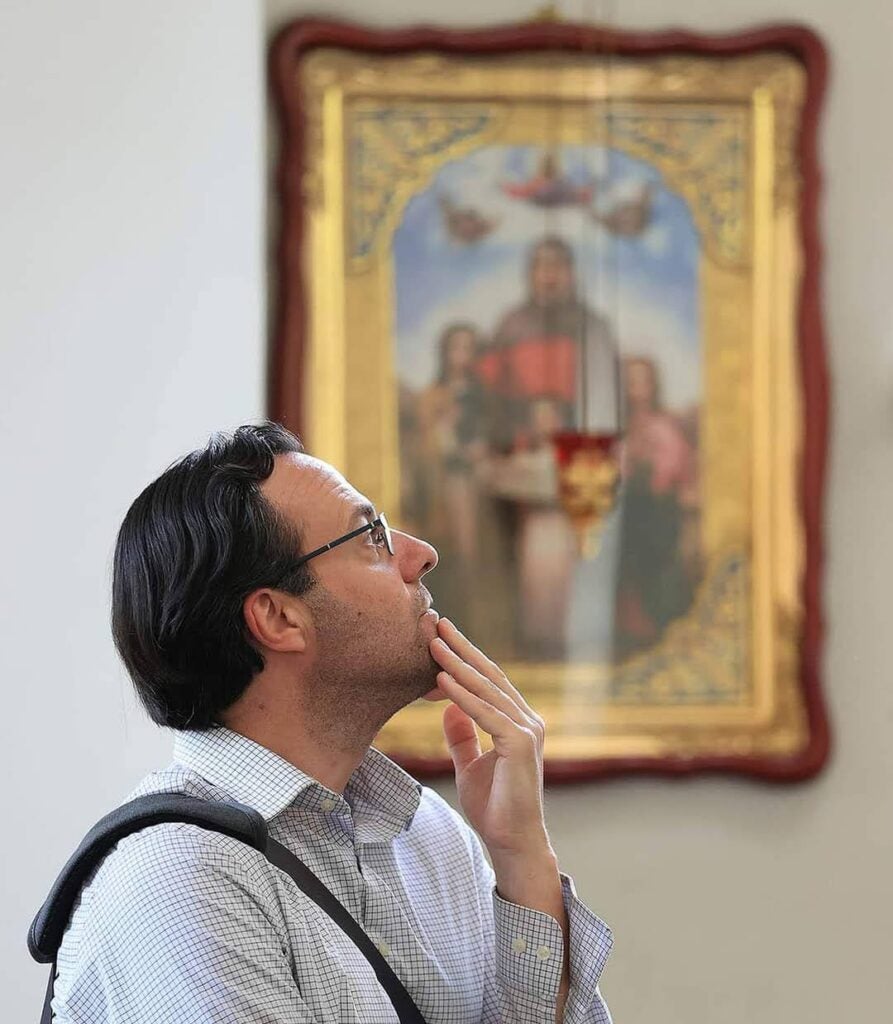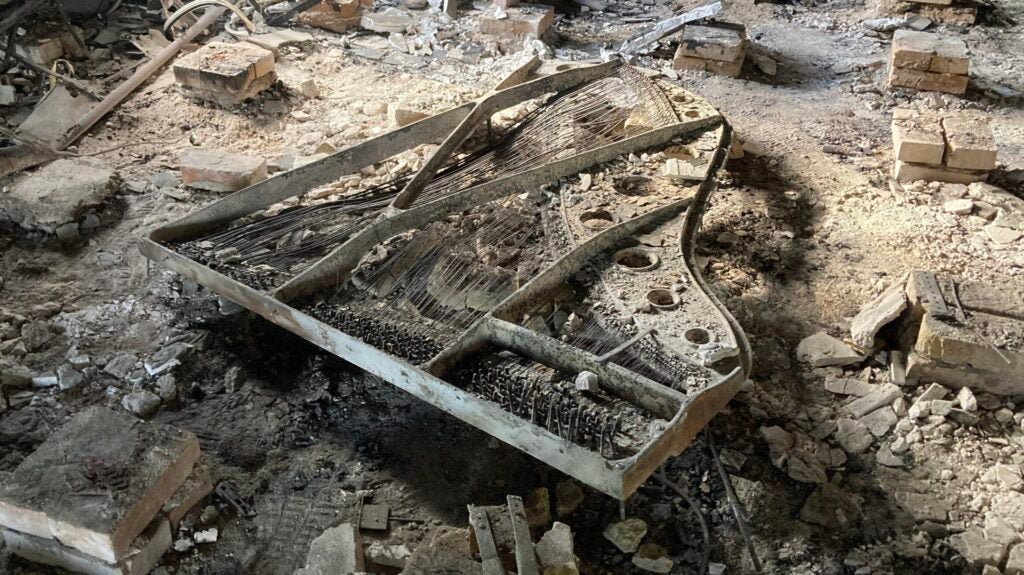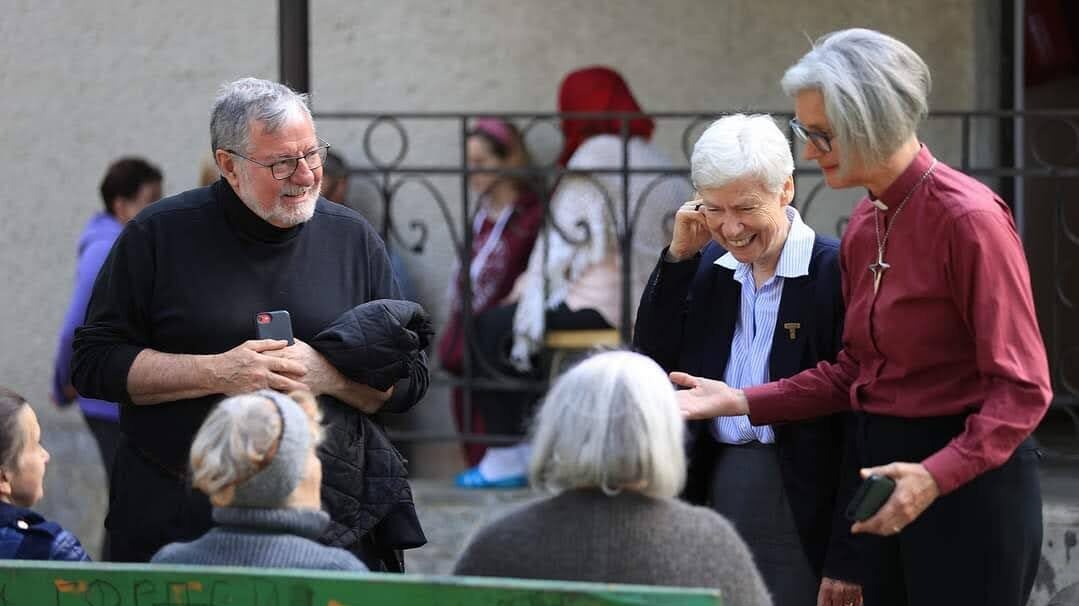Professors Partake in Just Peace Mission to Kyiv
Since the outset of Russia’s invasion of Ukraine, members of the Georgetown community, including faculty, students and staff have marshaled resources to support those in harm’s way and promote just peace, healing and reconciliation.
This summer, two Georgetown professors, José Casanova and Eli McCarthy, joined and helped organize a delegation of religious leaders traveling to Kyiv on May 24-25th at the invitation of Mayor Vitali Klitschko to advocate for peace and pray for justice. Casanova is a recognized expert on the dynamics of religious pluralism in Ukraine, speaks Ukrainian fluently and served as translator and interpreter during the delegation’s meetings with Ukrainian authorities and religious groups. Kyiv, the capital of Ukraine, has survived bombardments during the invasion.

Professor McCarthy in a Greek Catholic church in Kyiv.
Answering Material and Spiritual Needs
“Our purpose was to show solidarity with the people of Ukraine as well as to pray for a just peace,” explains McCarthy. “A deeper purpose was to create more space and humanizing energy to enhance the protection of civilians, reduce violence, increase humanitarian aid, accelerate an end to the war, and reinforce the ways of just peace.”
The international delegation boasted representatives from the Jewish, Muslim and Christian traditions, with six members traveling from the United States. The delegates engaged in prayer, pastoral accompaniment and the distribution of humanitarian aid, alongside forging connections with local peacebuilders, religious leaders and politicians.
“The war in Ukraine is not just a human tragedy, but a reminder of our communal failure to focus on breaking the dynamics of violence and dehumanization,” says McCarthy. “I hope this delegation encourages a wave of subsequent delegations, increases in humanitarian aid and peacebuilding, consistent humanitarian corridors, the flow of grain from the ports, a focus on dialogue and diplomacy and creative responses to strengthen the human community to persist in trying to save lives and end the killing in Ukraine.”
After this May 24-25 interfaith delegation, a participant from the UK was able to facilitate care for 1,000 Ukrainian youth to the UK. In June, a peace caravan, organized by some of the other delegates, sent 50 Italians to Odessa, where they worked to provide for the spiritual and material needs of the Ukrainian people. Some of these leaders are now staying with Ukrainians in Mykolaiv during the ongoing bombing. On July 11, a 150-person peace march occurred in Kyiv. One of the key advocacy calls of the interfaith delegation in May was to significantly increase humanitarian aid, which the European Union did on June 9. Another key advocacy call was to unblock ports so grain can flow, which has now progressed with the July 22 negotiated agreement.

The ashen remains of a grand piano in the House of Culture, destroyed during the attacks on Irpin.
As part of their professorial duties, both Casanova and McCarthy teach students not to accept the world as it is, but to imagine how it could be. McCarthy, a professor in the Program on Justice and Peace, teaches courses on Christian ethics, just peace advocacy, and nonviolent communication. He serves on the steering committee of the Catholic Nonviolence Initiative and his most recent book, A Just Peace Ethic Primer: Building Sustainable Peace and Breaking Cycles of Violence, pushes readers to manifest the struggle for just peace as a transformative praxis to engage conflict constructively.
Casanova, one of the world’s leading scholars in the sociology of religion, is a Senior Fellow at the Berkley Center for Religion, Peace, and World Affairs and a Professor Emeritus at Georgetown College of Arts and Sciences. His landmark work, Public Religions in the Modern World, is considered a modern classic. During the visit to Kyiv, he also met with leaders of the Orthodox Church of Ukraine, the largest Christian denomination in Ukraine, which received the Tomos of autocephaly from Bartholomew I, the Ecumenical Patriarch of Constantinople in 2019 – reflecting a commitment to ecumenical collaboration in the service of peace and justice previously illustrated at an April 2022 Georgetown event on “The Social Ethos of the Orthodox Church
